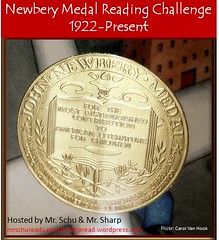It makes me sad that education has been reduced to the first five letters of the alphabet (six if your district gives out "Fs"). I am more concerned about giving my kids meaningful feedback, rather than assigning their work points based on my own opinion. I recently started having my students grade some of their own writing, specifically their writing journals. After I gave them the power, I began noticing improvements. Students weren't comfortable giving themselves full credit when they knew they hadn't put in the effort to edit and "flex their writing muscles." I love this new method so much, that I am going to use it more often for class work, specifically with assignments that are of a subjective nature (writing pieces, response journal entries, written responses to reading, etc.). This way, we can have a discussion about their work, with them putting forth enough effort to prove they deserve they grade they have given themselves. I may be so bold as to have students create a portfolio of their best work and come up with their quarterly grades, as suggested by Joe Bower on his blog (click here for a list of his blog posts related to abolishing grades.).
The only question is: will this be supported or seen and too radical? I am not a parent, so I can't speak for those who have children. However, logic tells me that most parents would rather a teacher spend his or her time guiding students, planning quality lessons, and providing feedback kids can use to actually improve upon their learning (a percentage and a smiley face do not good feedback make). But when I spend hours per evening as an intermediate reading and writing teacher grading close to 50 written responses multiple times a week, it's hard to do all three of those things and feel like I am doing them all well. If more teachers opposed the idea of grades and embraced the idea of feedback, would that help bring about the change we are anxiously awaiting for in education? What do you think?












Great post. I agree, I'd rather my kids become GREAT readers and spend their time actually reading than worrying about assessments. Thanks for sharing your thoughts. :)
ReplyDeleteSugar and Spice
I just found your blog and have enjoyed looking through your posts. I feel like we have been on a similar journey! I teach 4th grade and am the only one doing reader's workshop. I LOVE it and am still tweaking it.
ReplyDeleteWe had the last week off of school and I spent WAY too much of it grading and wondering if all my time was worth it. Like you, I have been wondering how grades are helping/hurting kids. Our district is moving toward PBL and design thinking- how do you boil those processes down to a grade? How do grades promote risk taking and the understanding that failure is sometimes part of the process?
Thank you both for the kind words.
ReplyDeleteJill, those are not easy questions to answer. I feel like I offend people when I speak up about my feelings about grading, but I can't keep it in any longer. Thankfully, my administration was receptive to the idea...in moderation. Obviously I cannot get rid of all grades because our district has an "ABCDE" report card for the intermediate grades and beyond. But, like Joe suggests, I can get the grades "out of their faces" as much as possible.
Our school has a program where we are able to post grades online. I do not like this because when I child dips below a "B," I often get panicked emails from parents about how their child can "bring up their grades." In other words, what can they do to get more "points?" It's never "What is he/she struggling with and how can I help at home?" It makes me sad.
What a post for me to read at this time in my life. I may be teaching 6th grade reading next year (well, all subjects actually), and might have a coworker convinced to attempt reading workshop with me instead of the basal program. Smiley face. :)
ReplyDeleteHowever, he has already asked how are we going to get our grades. Phrased just that way. Sad but true-that's how we speak in our district about grades. How are WE going to get OUR grades. We have to have 10 grades per subject per six weeks. Yuck!
He (and I have to admit I) do NOT want to spend all of our time grading lengthy assessments. However, we DO want the grades to be a true reflection of each child's abilities. And growth. :)
So-having said all of that, do you have any suggestions, magic for us? :)
Shannon
http://www.irunreadteach.wordpress.com
I do not have a magic solution, but I have found that giving the power back to the kids was very helpful. We critiqued and graded a lot of work in pairs. I didn't let them have the final say, but it helped save me some time because it gave me a place to start when I sat down to look over it myself. I also made it very clear that report card grades seemed to be more about work completion (which is a useful skill) versus actual knowledge, so my comments were very detailed about what they did well and what they struggled with.
DeleteI found your blog because I just found out I'm jumping from 2nd grade to 5th! Crazy! But I am really excited about it :) My latest post is about my move, so if you get a chance and don't mind, would you please share some tips?? I would love to know where to being!
ReplyDeletehttp://thesweetestthing623.blogspot.com/